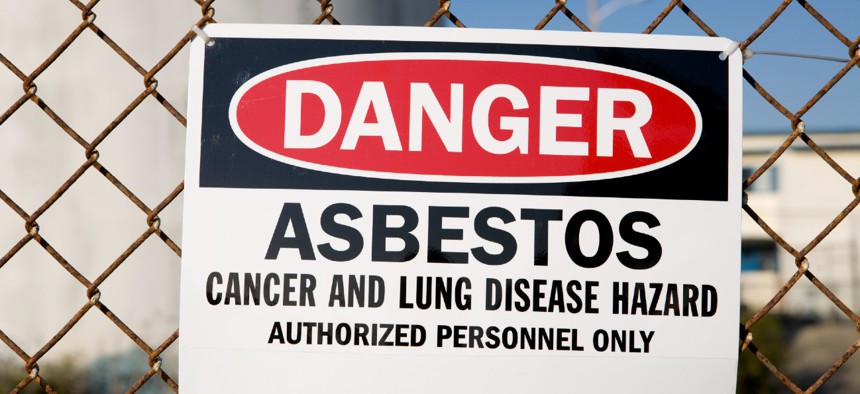
carterdayne / iStock.com
GSA Failed to Remove Asbestos, Arsenic, Explosives From Missouri Facility for Decades, Report Finds
GSA officials knew about hazardous materials at a former munitions plant turned federal office building but declined to notify employees and other agency tenants or restrict access to impacted areas, substantiating a whistleblower’s allegations.
The Office of Special Counsel announced Friday that it had substantiated a whistleblower’s allegations that the General Services Administration knew about the existence of hazardous materials and explosives at a federal office building in Missouri for at least 15 years yet failed to notify people who worked in the facility or take steps to mitigate the problem.
In a letter to President Biden accompanying the report, U.S. Special Counsel Henry Kerner wrote that as early as 2002, GSA officials knew about a panoply of hazardous materials, including asbestos, lead, mercury, cadmium, radon, polychlorinated biphenyls and arsenic, contaminating the Goodfellow Federal Center in St. Louis, but took no action to inform employees or tenant agencies. And following a whistleblower disclosure and Occupational Safety and Health Administration investigation in 2016, officials issued “overtly misleading” communications to employees that exhibited a “pattern of suppressing or downplaying risks.”
The facility also was found to have improperly stored explosives on the property.
GSA contracted the Health and Human Services Department’s Federal Occupational Health agency in 2019 to investigate the Goodfellow building after the American Federation of Government Employees urged lawmakers to intervene on the issue.
“[HHS] found that officials made no effort to restrict access to contaminated areas and did not promptly or effectively implement mitigation recommendations prior to 2016,” Kerner wrote. “According to the report this was part of a ‘significant pattern of ongoing, self-perpetuating management defects including a lack of oversight by and requirements/orders from the GSA central office, the site/region’s deficient environmental management systems, their management culture and a history of non-compliance, group think, a disbelief/discounting of the opinions and recommendations of subject matter experts, absent or overtly misleading hazard communication and a poor performance incentive system.’”
The Goodfellow Federal Center was built by the Defense Department in 1941, and it was first used as a small arms munitions plant during World War II. The complex hosts offices for several agencies, including the Veterans Benefits Administration and the Agriculture Department’s Farm Service Agency, as well as a child care center.
HHS’ Federal Occupational Health agency wrote in its report that it had substantiated most of the whistleblower’s allegations against GSA.
“It is [the occupational health agency's] opinion that the allegations summarized in the OSC letter are substantiated and that the various whistleblower allegations of mismanagement, waste of funds, abuse of authority, and substantial and specific danger to public/employee health from environmental contamination did, in fact, occur from 2002 through 2015,” the report stated. “Over that period, Goodfellow/[GSA] Region 6 management exhibited a pattern of ignoring numerous federal regulations, allowing unnecessary, continued and ongoing exposures to employees, tenants and contractors and failed to allocate the resources required to correct site deficiencies.”
Since 2016, GSA has been conducting remediation on the property, specifically to remove lead and asbestos. In light of the investigation’s findings, the agency said it has determined the building is “excess property” and plans to have most of its occupants relocated by the end of next year. In a November 2020 letter to OSC, then-GSA Chief of Staff Robert Borden acknowledged many of HHS’ findings but highlighted that the agency found few signs that the contamination negatively impacted building occupants’ health.
“I agree with the conclusion that many of the allegations presented to OSC have merit; however, since 2016 . . . I believe that [Public Buildings Service] Region 6 and PBS Central Office have implemented corrective action to address these allegations and continue to work to improve the [environmental, health, safety and fire protection] program at GSA,” Borden wrote. “Furthermore, [the occupational health agency] noted that a ‘key finding was that little documentation was found that pointed to actual adverse health effects suffered by GSA personnel or regulatory violations or penalties.’”
But HHS’ report was less positive on that front than Borden suggested, and noted that the agency was only allowed to peruse GSA health records, but not those of employees at tenant agencies or contractors.
“Available injury and illness logs did not reflect excessive occurrences as compared to similar, typical workplaces,” HHS wrote. “However, importantly, [the occupational health agency] notes that chronic health effects from exposures to site contaminants that may have occurred over the study period may have long latency periods, or have resulted in health effects that were not, at the time, known to be work-related. Illnesses due to toxic substance exposures may only show up later as medical payments on workers’ health insurance plans or on death certificates (e.g. mesothelioma).”
In Kerner’s letter, he noted that the whistleblower expressed “concern” at the report's findings. Specifically, the whistleblower found the study of potential injuries from contamination to be incomplete, and faulted GSA for merely assigning additional training to officials responsible for misleading building tenants, rather than any more serious penalties or discipline.
“[The whistleblower] opined that the environmental hazards at Goodfellow are part of a larger pattern of Region 6’s disregard for federal safety regulations and that the lack of personal accountability for agency officials, despite information showing that they misled employees and tenants, and downplayed the severity of the contamination, creates a permissive culture for continuing violations,” Kerner wrote. “[The whistleblower] also expressed concern about accumulated exposure to contaminants prior to 2016 and the timing, reliability and scope of testing . . . He also stated that GSA officials have never made a concerted effort to determine if employees, contractors, tenants or children suffered ill health because of their exposure to Goodfellow—including employees who left Goodfellow prior to 2016—and he implored officials to institute a claims process.”
Nonetheless, Kerner wrote that he determined GSA and HHS have met “all statutory requirements” and considered the matter closed.







